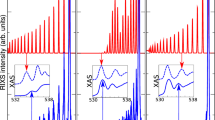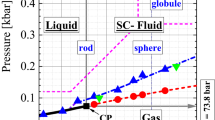Abstract
RADIOACTIVE carbon is utilised commonly to tag compounds used in interfacial studies. As is usual in studies with isotopes of carbon, it has been assumed tacitly that the radioactive surfactant behaves exactly like the untagged or inactive compound. During a study1 of condensed monolayers at the water–air interface, however, a significant kinetic isotope effect was observed in their stability behaviour.
This is a preview of subscription content, access via your institution
Access options
Subscribe to this journal
Receive 51 print issues and online access
$199.00 per year
only $3.90 per issue
Buy this article
- Purchase on Springer Link
- Instant access to full article PDF
Prices may be subject to local taxes which are calculated during checkout
Similar content being viewed by others
References
Neuman, R. D., thesis, Institute of Paper Chemistry, Appleton, Wisconsin (1973).
Pinchas, S., and Laulicht, I., Infrared Spectra of Labelled Compounds (Academic Press, London and New York, 1971).
Halevi, E. A., Prog. phys. org. Chem., 1, 109 (1963).
Author information
Authors and Affiliations
Rights and permissions
About this article
Cite this article
NEUMAN, R. An interfacial isotope effect. Nature 250, 725–726 (1974). https://doi.org/10.1038/250725a0
Received:
Revised:
Issue Date:
DOI: https://doi.org/10.1038/250725a0
Comments
By submitting a comment you agree to abide by our Terms and Community Guidelines. If you find something abusive or that does not comply with our terms or guidelines please flag it as inappropriate.



